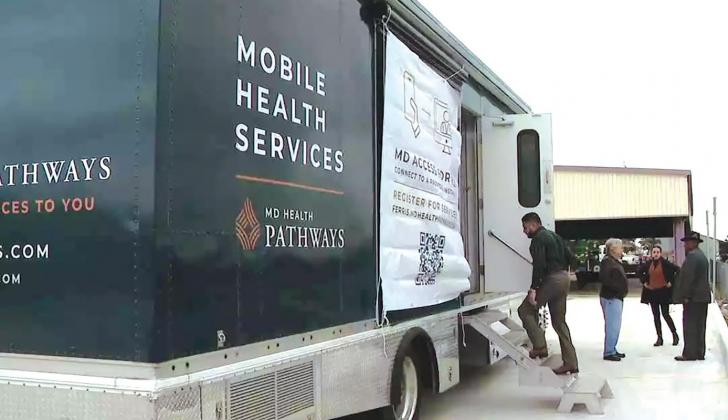Ferris ‘Access for All’ not government expansion
FERRIS – The City of Ferris rolled out its “Access for All” healthcare solution early last week.
“Access for All” was introduced back in the summer by Ferris City Manager Brooks Williams.
What has been called by many an unprecedented use of funding from the American Rescue Plan Act of 2021 (“ARPA”), has now began benefiting Ferris residents.
The mobile healthcare team from MD Health Pathways has set up shop on the city’s main square area and are offering free appointment, as promised with just an easy phone call or email to schedule.
“The answer to an uncomplicated healthcare system in our city has arrived and we are excited to offer all our residents easy healthcare through frontline doctors and nurses reinventing how community health services can meet the needs of the individual,” Williams said.
While some have said the program is just another example of government expansion or a city-wide tax increase, they would be wrong.
“The argument that this is cost prohibitive, or somehow a use of funds that is expanding government reach is incredible to me,” Williams explained pointing out for example, the federal government spends $144 billion a year on improper payments.
“They send checks to people who are not entitled to them on the earned income tax credit for example,” he said. “They spend money on people who do not exist, or who are not qualified for Medicaid, they even send money to dead people and the checks get cashed.
“We spend about $75 to $76 billion a year on Medicaid and on food stamps for adults who are able-bodied, who are 55 years of age and younger, and who don’t have a child, and many of them could work.”
To that end, Williams decided the math for Ferris and free healthcare looked pretty simple.
“This cost $55 a year per citizen,” he said. “There are 332 million people in the United States today. For about $20 billion we could provide this level of access to healthcare to every single person in this country. That is a fraction of the waste we spend on improper payments and a fraction of the waste we spend on unqualified Medicare payments.
“So, the issue is not that we don’t have the money. The issue is we don’t know how to spend the money. Anyone that says this is about government expansion is missing the point.
“This is about asking for your governments to start to do the right thing with the dollars that they already have. This program can cause a reduction in government healthcare spending while still providing a higher quality of service.”
While the process took several months to put into place before the mobile healthcare team was set up, Williams worked tirelessly with MD Health Pathways using the funds offered by the federal government to make it happen. His reasoning – to improve the system of healthcare for Ferris residents using both a mobile and virtual healthcare service model offering treatment, education, and personal care to the patient.
“Residents have found they can no longer only rely on the limitations of fixed health operations,” Williams said of the “Access for All” model. “With funding from the federal government, and no impact to our general fund or local taxpayers, we have created a health solution, for the health of all residents, that offers convenience, consistency, and efficiency through a combination of telehealth, cloud-based data management, mobile healthcare team deployment, low-cost essential medication delivery, and patient advocacy.”
When Williams introduced “Access for All” no municipality had addressed the issues of mental or physical help in this way.
“When the City of Ferris partnered with MD Health Pathways, a team of experienced frontline doctors, nurses, and certified caretakers, our goal was to be part of the continued importance of reinventing how health services meet the needs of the individual in order to achieve health equity,” Williams concluded. “Ferris is leading the pack. Local solutions create positive results for our residents, and I hope opens a way for more conversations about the importance of ongoing creative solutions that allow for valuable services to our citizens. This isn’t about more or bigger government, this is about a smarter, more agile, and problem-solving government.”
For more information, go to https://ferris.mdhealthpathways.com/

